Unit 2 I'll help to clean up the city parks Section A(1a-2c)课件(共51张PPT)
文档属性
| 名称 | Unit 2 I'll help to clean up the city parks Section A(1a-2c)课件(共51张PPT) |
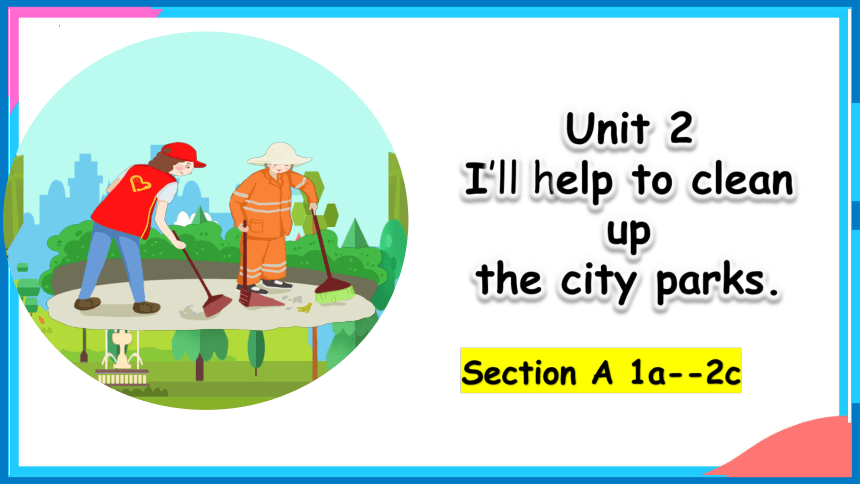
|
|
| 格式 | pptx | ||
| 文件大小 | 63.8MB | ||
| 资源类型 | 教案 | ||
| 版本资源 | 人教新目标(Go for it)版 | ||
| 科目 | 英语 | ||
| 更新时间 | 2024-02-28 00:00:00 | ||
图片预览

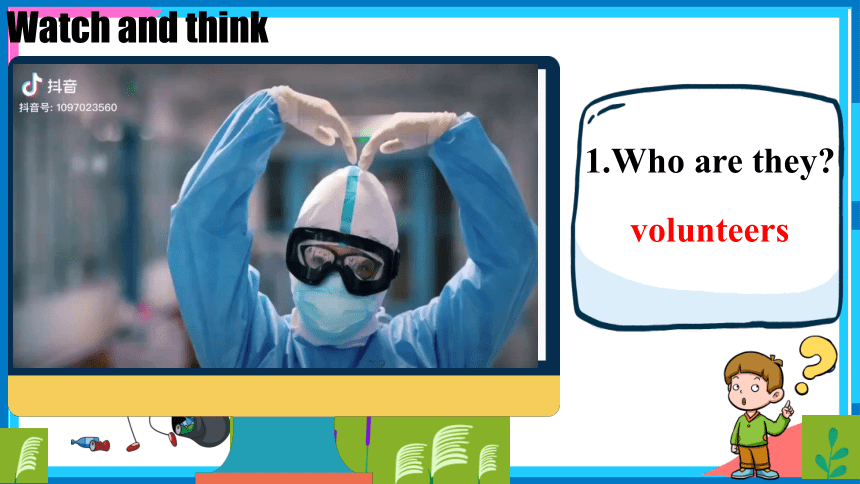
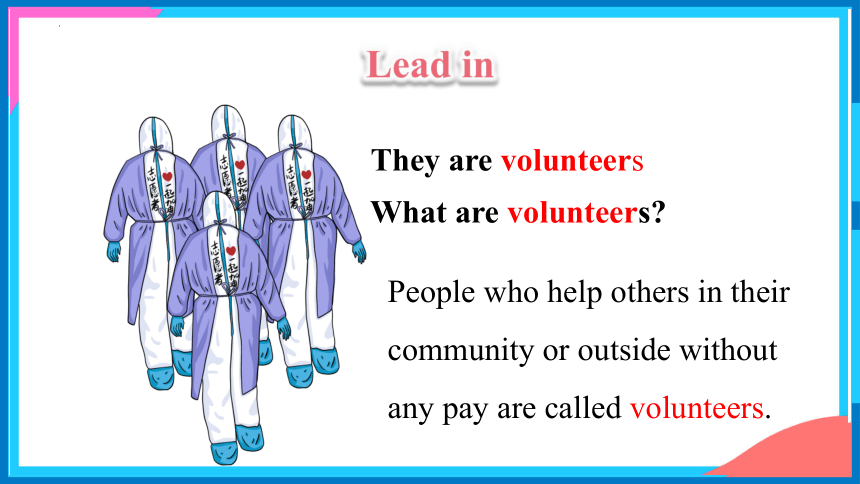
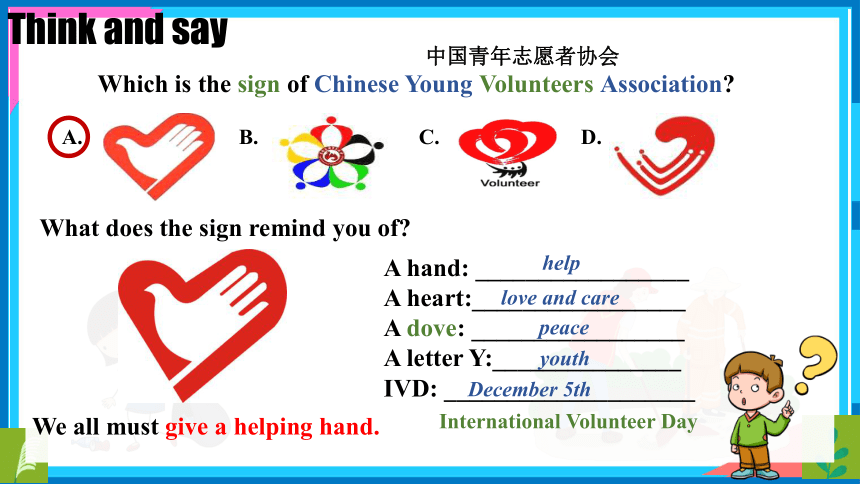
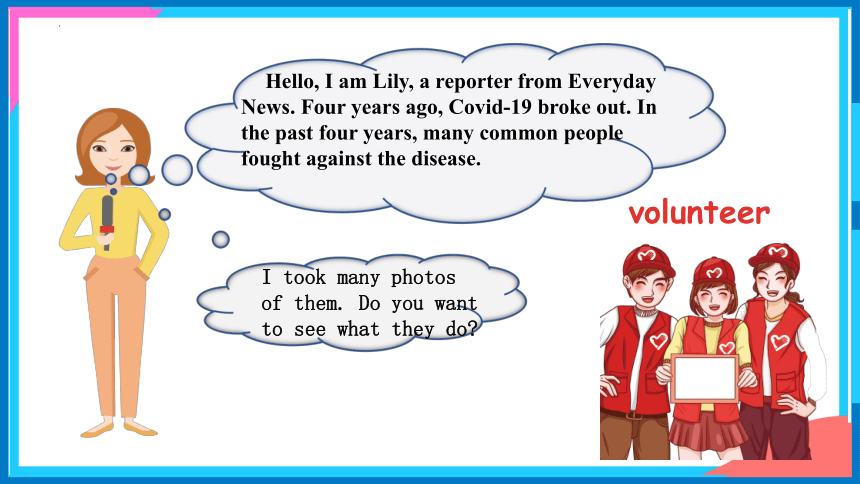
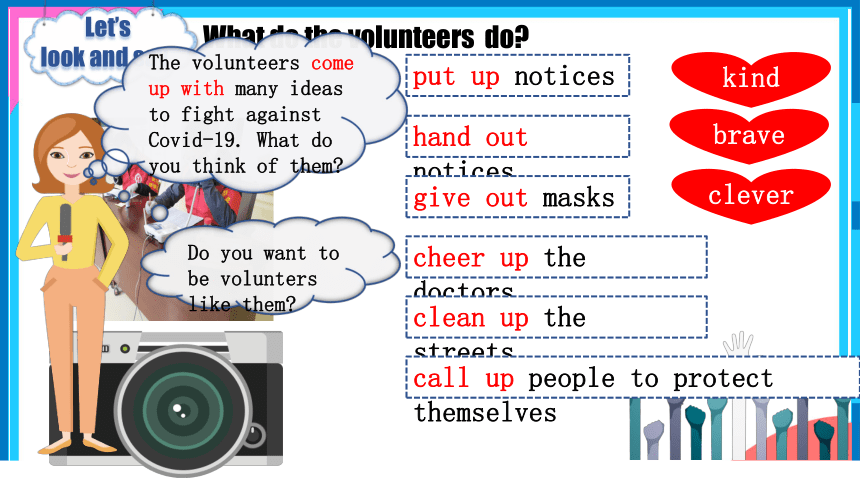
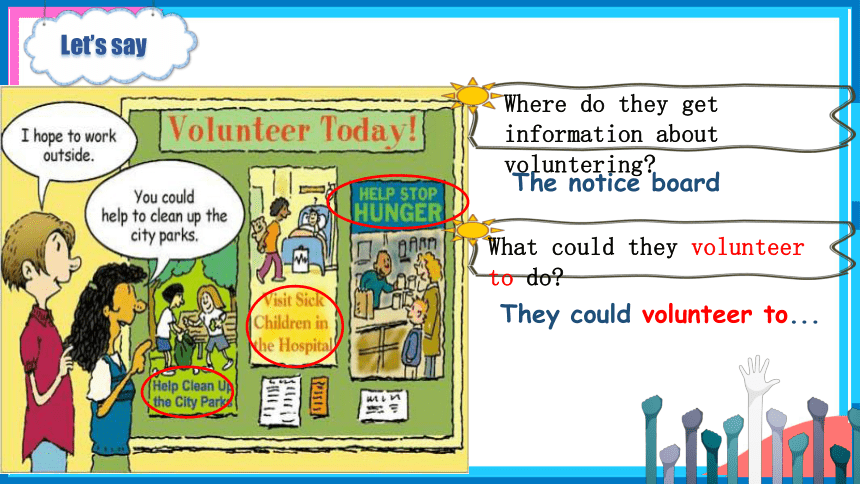
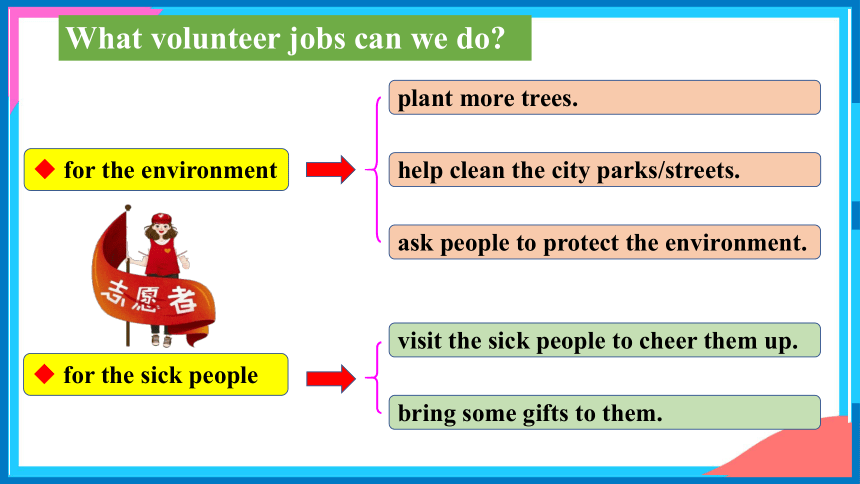
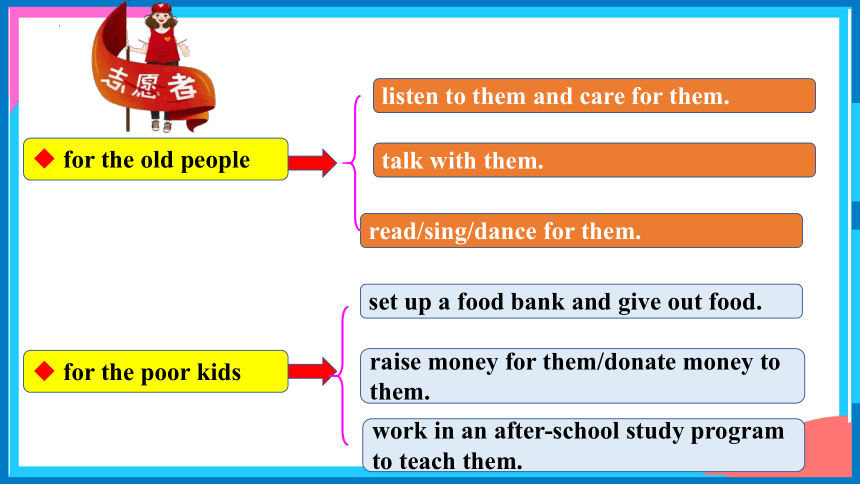
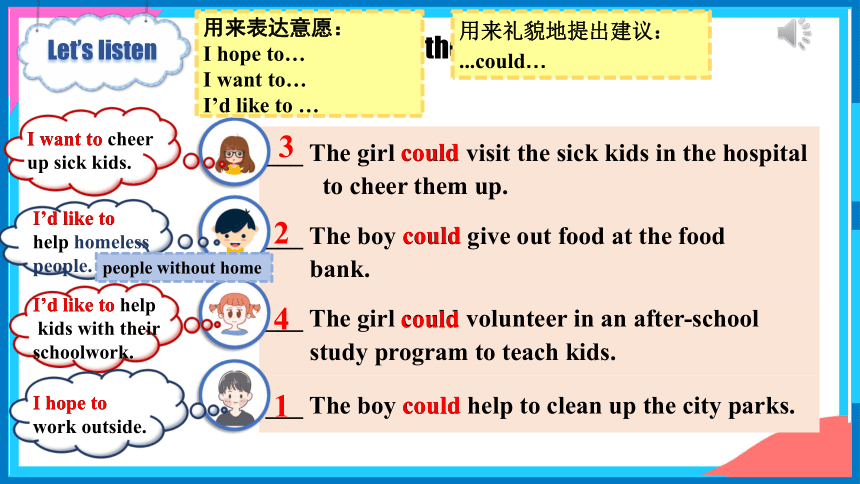
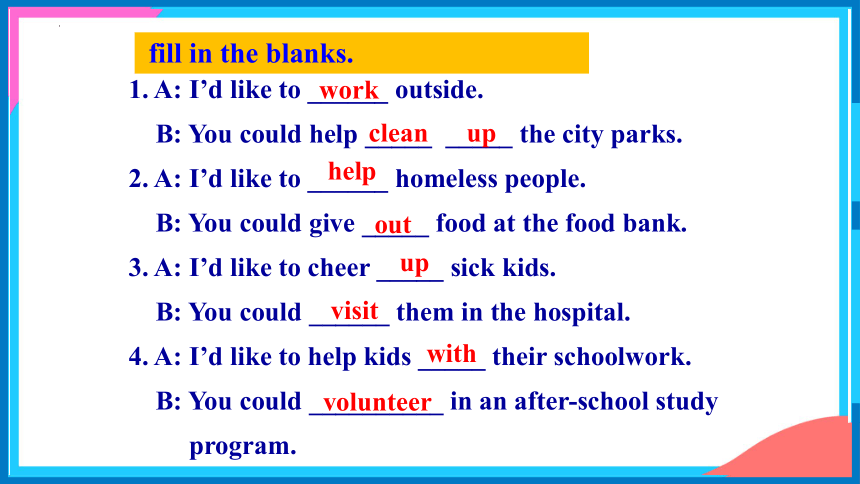
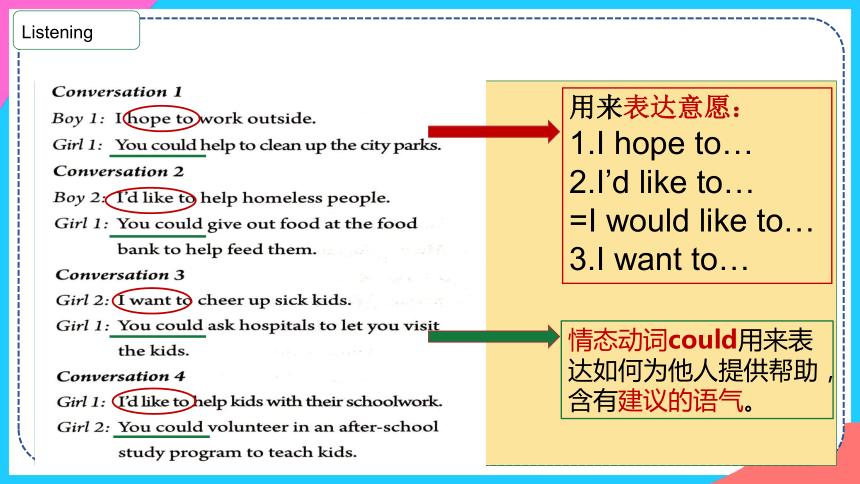
文档简介
(共51张PPT)
Section A 1a--2c
Unit 2
I’ll help to clean up
the city parks.
1.Who are they
volunteers
Watch and think
Lead in
They are volunteers
What are volunteers
People who help others in their community or outside without any pay are called volunteers.
Think and say
Which is the sign of Chinese Young Volunteers Association
A.
B.
C.
D.
中国青年志愿者协会
What does the sign remind you of
A hand: _________________
A heart:_________________
A dove: _________________
A letter Y:_______________
IVD: ____________________
help
love and care
peace
youth
International Volunteer Day
December 5th
We all must give a helping hand.
Hello, I am Lily, a reporter from Everyday News. Four years ago, Covid-19 broke out. In the past four years, many common people fought against the disease.
I took many photos of them. Do you want to see what they do
volunteer
What do the volunteers do
put up notices
hand out notices
give out masks
cheer up the doctors
clean up the streets
call up people to protect themselves
Do you want to be volunters like them
Let’s
look and say
kind
brave
clever
The volunteers come up with many ideas to fight against Covid-19. What do you think of them
Let’s say
Where do they get information about voluntering
What could they volunteer to do
The notice board
They could volunteer to...
What volunteer jobs can we do
for the environment
help clean the city parks/streets.
plant more trees.
ask people to protect the environment.
for the sick people
bring some gifts to them.
visit the sick people to cheer them up.
talk with them.
listen to them and care for them.
read/sing/dance for them.
raise money for them/donate money to them.
set up a food bank and give out food.
work in an after-school study program to teach them.
for the old people
for the poor kids
Listen and number the ways they volunteer.
___ The girl could visit the sick kids in the hospital to cheer them up.
___ The boy could give out food at the food
bank.
___ The girl could volunteer in an after-school
study program to teach kids.
___ The boy could help to clean up the city parks.
1
2
3
4
Let’s listen
I want to cheer up sick kids.
I’d like to help homeless people.
I’d like to help
kids with their
schoolwork.
I hope to work outside.
people without home
用来表达意愿:
I hope to…
I want to…
I’d like to …
用来礼貌地提出建议:
...could…
I hope to
I’d like to
I’d like to
I want to
could
could
could
could
1. A: I’d like to ______ outside.
B: You could help _____ _____ the city parks.
2. A: I’d like to ______ homeless people.
B: You could give _____ food at the food bank.
3. A: I’d like to cheer _____ sick kids.
B: You could ______ them in the hospital.
4. A: I’d like to help kids _____ their schoolwork.
B: You could __________ in an after-school study
program.
work
up
help
out
up
visit
with
volunteer
fill in the blanks.
clean
Listening
用来表达意愿:
1.I hope to…
2.I’d like to…
=I would like to…
3.I want to…
情态动词could用来表达如何为他人提供帮助,含有建议的语气。
Pair work
Let’s be volunteers!
Brainstorm the other ways they could help people.
teach kids in a sport or hobby
help disabled/
elderly people with chores/shopping…
donate clothes/toys/food to people who need them
1a Look at the ways you could help people in the picture.
Then list other ways.
Other ways you could help people
1. ________________________________
2. ________________________________
3. ________________________________
4. ________________________________
Help the old/the disabled people to cross the road.
Help athletes translate at the Beijing 2022 Winter Olympics.
Help doctors fight against COVID-19.
Help children with their homework.
Ways we could offer help at school:
clean up the classroom
打扫/清除干净
to collect or hand out exercise books
分发
to put up a notice
v. 义务做,自愿做
volunteer to do sth.
n. 志愿者
to volunteer to help classmates to learn
n. 通知;通告;注意
v. 注意到;意识到
Ways we could offer help (outside school):
to care for lonely old people and cheer them up
care for 照顾,非常喜欢
lonely adj. 孤独的;寂寞的
cheer v. 欢呼; 喝彩
cheer up (使)变得更高兴;振奋起来
to work in an old people’s home
to help the old go across the road
to help to give out food
分发,散发
1c Practice the conversation in the picture above. Then make other conversations using the information in 1b.
Practice
You could help to clean up the city.
I hope to work outside.
You could ...
I’d like to / I want to ...
I meet a group of students. They want to be volunteers too. Can you guess what they want to do
These students are planning a City Park Clean-Up Day.
What can they do to tell people about it
They’d like to clean up the city park.
Let’s think
Can you come up with some ways to tell people about their plan
They could...
put an ad on TV
call up friends
put up some signs
put an ad in the newspaper
hand out notices
Let’s listen
Listen and check (√) the things they are going to do to tell people about it.
a
b
c
d
e
√
√
√
call up friends
put up some signs
hand out notices
Let’s listen
Listen again. Fill in the blanks.
1. We need to _____ ____ _____ a plan to tell people
about the city park clean-up.
2. Clean-Up Day is only two weeks from now. We
can’t ____ ____ making a plan.
3. We could ____ ____ signs.
4. Let’s make some notices, too. Then I’ll ____ them
____ after school.
5. We could each ____ ___ 10 students and ask them to come.
come up with
put off
put up
hand
out
call up
Tip: You can write down the first or the first two letters.
Let’s listen and imitate
Boy 1:Now we need to come up with a plan to tell people
about the city park clean-up.
Girl 1:Yeah, but I’m hungry, Bob. Let’s have lunch first.
Girl 2:No, we need to start now.
Clean-up Day is only two weeks from now.
Boy 2:You’re right, Sally. We can’t put off making a plan.
As we talk, I’ll write down all our ideas.
Then we can decide which ideas are best.
Girl 1:Um…well…we could put up signs.
Boy 2:That’s a good idea!
Girl 2:Let’s make some notices, too.
Then I’ll hand them out after school.
Boy 1:OK. Great! And we could each call up 10 students
and ask them to come.
Boy 2:Hey, we’re coming up with a lot of good ideas, aren’t we
Liaison 连读
Think and write
According to what you heard in 2b, use right phrasal verbs to fill in the blanks.
We’d like to help ______ ______ the city parks. First, we need to ______ ______ ______a plan. Clean-up Day is only two weeks from now, so we can’t_______ _______making a plan any more. There are some ways we could tell others. We could_______ ______signs and we also could each_______ _______ ten people and ask them to come. Besides, we’ll ______ _______ advertisements after school. That’s great. We are thinking up a lot of ideas. We should ______ _____ all our ideas.
come up with
put
off
clean up
put
up
call up
hand out
write down
Let’s think
Don’t ________ till tomorrow what should be done today.
put off
Yeah, but I’m hungry, Bob.
Let’s have lunch first.
No, we need to start now.
Clean-up Day is only two weeks from now.
If they have lunch first, they have to put off making the plan.
They won’t have enough time to finish the plan.
The Chinese Young Volunteers Association is going to organize an activity to visit old people. You are the volunteers. What could you do to help out with
Task 15 Discuss in groups.
Production
The ways you could help old people:
____________________________________________________________________________________________________________________________________
What can we do on City Park Clean-Up Day Write down your plan.
Call up friends.
Give out notices.
Put an ad in the newspaper.
Put an ad on TV.
Put up some signs.
…
Let’s help
Hello, everyone! I’m a student who hopes to work in an old people’s home. Here
are some ways which I come up with. As a student, I think I could_____________________________.
Also, I would like _______________________.
Besides, I plan to ___________________________________.
In a word, I want to do my part helping the old people!
The old people’s home needs some e up with at least three things you could do to help the old people!
Work in groups.
Work in groups to summarize the phrasal verbs you learned today. Then list them out.
1. clean up
2. give out
3. cheer up
4. put up
5. call up
6. hand out
7. put off
8. come up with
9. care for
Practice
Task 12 Observe, analyze, discuss and find out the
meanings.
I'll help to clean up the city parks.
The boy could give out food at the food bank.
You could visit sick kids in the hospital to cheer them up.
We could put up signs.
We could each call up 10 students and ask them to come.
We can't put off making a plan.
I'll hand them out after school.
We're coming up with lots of good ideas.
清理;打扫
分发;散发
使高兴;使振奋
张贴
打电话给某人
推迟;延迟
分发;散发
提出;想出
Practice
Observe and discuss the positions of objects.
I'll help to clean up the city parks.
The boy could give food out at the food bank.
You could visit sick kids in the hospital to cheer them up.
We could put up signs.
We could each call up 10 students and ask them to come.
I'll hand them out after school.
Turn it on, please.
Conclusion: Forms of phrasal verbs (v. + adv.) + objects
______________________________________________
___________________________________________________
若宾语是名词时,可放在副词前后(1. 2. 4. 5.);
若宾语是代词(it / them)时,放在副词前(3. 6. 7.)。
Practice
The benefits of volunteering
There are many people around us, in our country or even in the world who need different kinds of help. So voluntary work is important and great. Not only can it make people live better but also it can bring happiness to volunteers.
How do you understand words “volunteer”
Show love to the world !
We could do better!
Language points
clean up: 是省去 to 的动词不定式,意为“(把……)打扫干净”、“梳理整齐”。
clean-up: n. “清扫,扫除”
We spent all Saturday morning cleaning up.
我们整个星期六上午都在打扫卫生。
It's time you gave your bedroom a good clean-up.
你该好好打扫一下你的卧室了。
1. You could help to clean up the city parks.
Language points
call up:
“打电话给……”
My dad called me up to tell me the good news.
我爸爸打电话告诉了我这个好消息。
Call me up any time.
随时打电话给我。
3. And we could each call up 10 students and ask them to come.
Language points
1. give … a call
I’ll give you a call at the weekend.
2. ring up
Did you ring up your father last week
3. give …a ring
Do you know who gave Zhang Hua a ring an hour ago
4. telephone /phone (to)…
Will you please telephone to the policeman
“给……打电话”的常见说法
Language points
help out/help sb. out:
“帮助某人摆脱困境”
Her parents helped (her) out with a 500 loan.
她父母借给她500英镑救了急。
He’s always willing to help out.
他总是急人之难。
4. What did they ask you to help out with
Language points
The man needs an English dictionary when he works.
这个人在工作时需要一本英语词典。
Do you need to see him yourself
你必需亲自见他吗?
5. Now we need to come up with a plan to tell people about the city park clean-up.
need : 是一个常见的动词,表示“需要”之意。它既可以作实义动词,也可以作情态动词。
1) need 用作实义动词,有“必要”、“必需”之意,有人称、数和时态的变化,可以接名词、代词、动名词或带to 的动词不定式作宾语,构成疑问句和否定句时要借助于助动词。
Language points
Need you go to the park with your classmate
你必须和你的同学去公园吗?
He needn’t spend much money for this new watch.
他不必花掉这么多钱买这块新手表。
6. Now we need to come up with a plan to tell people about the city park clean-up.
2) need,用作情态动词, “必须”、“必要”,没有人称、数等变化,后接不带to 的动词不定式。 通常用于疑问句和否定句中,构成疑问句和否定句时,不需要使用助动词。
【注意】 由need引出的疑问句,答语表肯定时用must或have to;表示否定时用needn’t或don’t have to。
1. -- Need I come to work tomorrow 明天我需要来上班吗
-- Yes, you must / have to. 是的,你必须来。
2. -- Need I finish the work at once
我需要马上完成这项工作吗?
-- No, you needn’t / don’t have to.
不,不必今天完成。
Language points
come up with:
“想出,提出(主意或计划)”
Bob came up with a good idea to solve the problem.
鲍勃想出了一个解决问题的好办法。
She’s come up with some amazing scheme to double her income.
她想出一个惊人的计划来使自己的收入翻倍。
7. Now we need to come up with a plan to tell people about the city park clean-up.
Language points
8. They told me stories about the past and how things used to be.
used to 曾经……;过去……
used to 的各种句式:
used to的句式 肯定句 主语+used to do...
否定句 主语+used not to/usedn’t to/didn’t use to do...
疑问句 Did+ 主语+use to do... 或Used+ 主语+to do...
Language points
辨析:be used to doing, be used to do 与used to do
be used to doing “习惯做……”, to 是介词,后接名词、代词或动词-ing 形式。
be used to do “被用来做……”, to 为不定式符号;后接动词原形。
used to do “曾经……;过去……”, to 是不定式符号;后跟动词原形。
Language points
9. Yeah, a lot of old people are lonely.
lonely adj. 孤独的;寂寞的
He always feels lonely and wants to have a friend to talk to.
他总是感到孤独,想有个说话的朋友。
lonely 形容词 孤独的;寂寞的 强调主观感情,心灵上的孤独,具有伤感色彩
alone 形容词 单独的;独自的 强调客观情况,数量上就一个。
副词 单独;独自
【辨析】lonely与alone
Language points
care for:
1) “照看,照料,护理(尤指幼、老、病者)”
2) “喜欢,喜爱(某人)”
She moved back home to care for her elderly parents.
她搬回家住,好照料年迈的双亲。
You know I care for you, Peter.
彼得,你知道我喜欢你。
10. We should listen to them and care for them.
一、根据句意及首字母提示填写单词。
1.Judy is very kind.She often v_________ in the Old People's Home.
2.—Jim looks very sad.Let's c_________ him up.
—OK.I think we can give him a surprise.
3.Jenny usually stays at home by herself, so she feels l_______.
4.We are going to c__________ up the city park this weekend.
5.Look at the s________ ! Don't cross the road! It's very dangerous.
volunteers
cheer
lonely
clean
sign
Exercise
Exercises
房间太脏了,请打扫干净。
The room is too dirty. Please _____ _____ _____.
这位老人独自生活,但他从不感到孤独。
The old man lives _____ , but he never feels ______.
许多青少年关心老人,他们经常在公共汽车上给老人让座。
Many teenagers _____ _____ the old and they often offer their seats to them on buses.
clean it up
二、完成句子
1
2
3
care for
alone
lonely
Evaluation Form
Further efforts Just so-so Good Perfect
I've learned key phrases and key sentences about offering help.
I can make conversations about offering help.
I can get specific information from listening.
I know how to help others.
Evaluation and praise
Evaluation
Homework
1.Write three conversations about your discussions with your classmates.
A: I’d like to help the old. What could I do
B: You could give them medical service.
2. Preview Unit 2-Section A(3a-3c).
Section A 1a--2c
Unit 2
I’ll help to clean up
the city parks.
1.Who are they
volunteers
Watch and think
Lead in
They are volunteers
What are volunteers
People who help others in their community or outside without any pay are called volunteers.
Think and say
Which is the sign of Chinese Young Volunteers Association
A.
B.
C.
D.
中国青年志愿者协会
What does the sign remind you of
A hand: _________________
A heart:_________________
A dove: _________________
A letter Y:_______________
IVD: ____________________
help
love and care
peace
youth
International Volunteer Day
December 5th
We all must give a helping hand.
Hello, I am Lily, a reporter from Everyday News. Four years ago, Covid-19 broke out. In the past four years, many common people fought against the disease.
I took many photos of them. Do you want to see what they do
volunteer
What do the volunteers do
put up notices
hand out notices
give out masks
cheer up the doctors
clean up the streets
call up people to protect themselves
Do you want to be volunters like them
Let’s
look and say
kind
brave
clever
The volunteers come up with many ideas to fight against Covid-19. What do you think of them
Let’s say
Where do they get information about voluntering
What could they volunteer to do
The notice board
They could volunteer to...
What volunteer jobs can we do
for the environment
help clean the city parks/streets.
plant more trees.
ask people to protect the environment.
for the sick people
bring some gifts to them.
visit the sick people to cheer them up.
talk with them.
listen to them and care for them.
read/sing/dance for them.
raise money for them/donate money to them.
set up a food bank and give out food.
work in an after-school study program to teach them.
for the old people
for the poor kids
Listen and number the ways they volunteer.
___ The girl could visit the sick kids in the hospital to cheer them up.
___ The boy could give out food at the food
bank.
___ The girl could volunteer in an after-school
study program to teach kids.
___ The boy could help to clean up the city parks.
1
2
3
4
Let’s listen
I want to cheer up sick kids.
I’d like to help homeless people.
I’d like to help
kids with their
schoolwork.
I hope to work outside.
people without home
用来表达意愿:
I hope to…
I want to…
I’d like to …
用来礼貌地提出建议:
...could…
I hope to
I’d like to
I’d like to
I want to
could
could
could
could
1. A: I’d like to ______ outside.
B: You could help _____ _____ the city parks.
2. A: I’d like to ______ homeless people.
B: You could give _____ food at the food bank.
3. A: I’d like to cheer _____ sick kids.
B: You could ______ them in the hospital.
4. A: I’d like to help kids _____ their schoolwork.
B: You could __________ in an after-school study
program.
work
up
help
out
up
visit
with
volunteer
fill in the blanks.
clean
Listening
用来表达意愿:
1.I hope to…
2.I’d like to…
=I would like to…
3.I want to…
情态动词could用来表达如何为他人提供帮助,含有建议的语气。
Pair work
Let’s be volunteers!
Brainstorm the other ways they could help people.
teach kids in a sport or hobby
help disabled/
elderly people with chores/shopping…
donate clothes/toys/food to people who need them
1a Look at the ways you could help people in the picture.
Then list other ways.
Other ways you could help people
1. ________________________________
2. ________________________________
3. ________________________________
4. ________________________________
Help the old/the disabled people to cross the road.
Help athletes translate at the Beijing 2022 Winter Olympics.
Help doctors fight against COVID-19.
Help children with their homework.
Ways we could offer help at school:
clean up the classroom
打扫/清除干净
to collect or hand out exercise books
分发
to put up a notice
v. 义务做,自愿做
volunteer to do sth.
n. 志愿者
to volunteer to help classmates to learn
n. 通知;通告;注意
v. 注意到;意识到
Ways we could offer help (outside school):
to care for lonely old people and cheer them up
care for 照顾,非常喜欢
lonely adj. 孤独的;寂寞的
cheer v. 欢呼; 喝彩
cheer up (使)变得更高兴;振奋起来
to work in an old people’s home
to help the old go across the road
to help to give out food
分发,散发
1c Practice the conversation in the picture above. Then make other conversations using the information in 1b.
Practice
You could help to clean up the city.
I hope to work outside.
You could ...
I’d like to / I want to ...
I meet a group of students. They want to be volunteers too. Can you guess what they want to do
These students are planning a City Park Clean-Up Day.
What can they do to tell people about it
They’d like to clean up the city park.
Let’s think
Can you come up with some ways to tell people about their plan
They could...
put an ad on TV
call up friends
put up some signs
put an ad in the newspaper
hand out notices
Let’s listen
Listen and check (√) the things they are going to do to tell people about it.
a
b
c
d
e
√
√
√
call up friends
put up some signs
hand out notices
Let’s listen
Listen again. Fill in the blanks.
1. We need to _____ ____ _____ a plan to tell people
about the city park clean-up.
2. Clean-Up Day is only two weeks from now. We
can’t ____ ____ making a plan.
3. We could ____ ____ signs.
4. Let’s make some notices, too. Then I’ll ____ them
____ after school.
5. We could each ____ ___ 10 students and ask them to come.
come up with
put off
put up
hand
out
call up
Tip: You can write down the first or the first two letters.
Let’s listen and imitate
Boy 1:Now we need to come up with a plan to tell people
about the city park clean-up.
Girl 1:Yeah, but I’m hungry, Bob. Let’s have lunch first.
Girl 2:No, we need to start now.
Clean-up Day is only two weeks from now.
Boy 2:You’re right, Sally. We can’t put off making a plan.
As we talk, I’ll write down all our ideas.
Then we can decide which ideas are best.
Girl 1:Um…well…we could put up signs.
Boy 2:That’s a good idea!
Girl 2:Let’s make some notices, too.
Then I’ll hand them out after school.
Boy 1:OK. Great! And we could each call up 10 students
and ask them to come.
Boy 2:Hey, we’re coming up with a lot of good ideas, aren’t we
Liaison 连读
Think and write
According to what you heard in 2b, use right phrasal verbs to fill in the blanks.
We’d like to help ______ ______ the city parks. First, we need to ______ ______ ______a plan. Clean-up Day is only two weeks from now, so we can’t_______ _______making a plan any more. There are some ways we could tell others. We could_______ ______signs and we also could each_______ _______ ten people and ask them to come. Besides, we’ll ______ _______ advertisements after school. That’s great. We are thinking up a lot of ideas. We should ______ _____ all our ideas.
come up with
put
off
clean up
put
up
call up
hand out
write down
Let’s think
Don’t ________ till tomorrow what should be done today.
put off
Yeah, but I’m hungry, Bob.
Let’s have lunch first.
No, we need to start now.
Clean-up Day is only two weeks from now.
If they have lunch first, they have to put off making the plan.
They won’t have enough time to finish the plan.
The Chinese Young Volunteers Association is going to organize an activity to visit old people. You are the volunteers. What could you do to help out with
Task 15 Discuss in groups.
Production
The ways you could help old people:
____________________________________________________________________________________________________________________________________
What can we do on City Park Clean-Up Day Write down your plan.
Call up friends.
Give out notices.
Put an ad in the newspaper.
Put an ad on TV.
Put up some signs.
…
Let’s help
Hello, everyone! I’m a student who hopes to work in an old people’s home. Here
are some ways which I come up with. As a student, I think I could_____________________________.
Also, I would like _______________________.
Besides, I plan to ___________________________________.
In a word, I want to do my part helping the old people!
The old people’s home needs some e up with at least three things you could do to help the old people!
Work in groups.
Work in groups to summarize the phrasal verbs you learned today. Then list them out.
1. clean up
2. give out
3. cheer up
4. put up
5. call up
6. hand out
7. put off
8. come up with
9. care for
Practice
Task 12 Observe, analyze, discuss and find out the
meanings.
I'll help to clean up the city parks.
The boy could give out food at the food bank.
You could visit sick kids in the hospital to cheer them up.
We could put up signs.
We could each call up 10 students and ask them to come.
We can't put off making a plan.
I'll hand them out after school.
We're coming up with lots of good ideas.
清理;打扫
分发;散发
使高兴;使振奋
张贴
打电话给某人
推迟;延迟
分发;散发
提出;想出
Practice
Observe and discuss the positions of objects.
I'll help to clean up the city parks.
The boy could give food out at the food bank.
You could visit sick kids in the hospital to cheer them up.
We could put up signs.
We could each call up 10 students and ask them to come.
I'll hand them out after school.
Turn it on, please.
Conclusion: Forms of phrasal verbs (v. + adv.) + objects
______________________________________________
___________________________________________________
若宾语是名词时,可放在副词前后(1. 2. 4. 5.);
若宾语是代词(it / them)时,放在副词前(3. 6. 7.)。
Practice
The benefits of volunteering
There are many people around us, in our country or even in the world who need different kinds of help. So voluntary work is important and great. Not only can it make people live better but also it can bring happiness to volunteers.
How do you understand words “volunteer”
Show love to the world !
We could do better!
Language points
clean up: 是省去 to 的动词不定式,意为“(把……)打扫干净”、“梳理整齐”。
clean-up: n. “清扫,扫除”
We spent all Saturday morning cleaning up.
我们整个星期六上午都在打扫卫生。
It's time you gave your bedroom a good clean-up.
你该好好打扫一下你的卧室了。
1. You could help to clean up the city parks.
Language points
call up:
“打电话给……”
My dad called me up to tell me the good news.
我爸爸打电话告诉了我这个好消息。
Call me up any time.
随时打电话给我。
3. And we could each call up 10 students and ask them to come.
Language points
1. give … a call
I’ll give you a call at the weekend.
2. ring up
Did you ring up your father last week
3. give …a ring
Do you know who gave Zhang Hua a ring an hour ago
4. telephone /phone (to)…
Will you please telephone to the policeman
“给……打电话”的常见说法
Language points
help out/help sb. out:
“帮助某人摆脱困境”
Her parents helped (her) out with a 500 loan.
她父母借给她500英镑救了急。
He’s always willing to help out.
他总是急人之难。
4. What did they ask you to help out with
Language points
The man needs an English dictionary when he works.
这个人在工作时需要一本英语词典。
Do you need to see him yourself
你必需亲自见他吗?
5. Now we need to come up with a plan to tell people about the city park clean-up.
need : 是一个常见的动词,表示“需要”之意。它既可以作实义动词,也可以作情态动词。
1) need 用作实义动词,有“必要”、“必需”之意,有人称、数和时态的变化,可以接名词、代词、动名词或带to 的动词不定式作宾语,构成疑问句和否定句时要借助于助动词。
Language points
Need you go to the park with your classmate
你必须和你的同学去公园吗?
He needn’t spend much money for this new watch.
他不必花掉这么多钱买这块新手表。
6. Now we need to come up with a plan to tell people about the city park clean-up.
2) need,用作情态动词, “必须”、“必要”,没有人称、数等变化,后接不带to 的动词不定式。 通常用于疑问句和否定句中,构成疑问句和否定句时,不需要使用助动词。
【注意】 由need引出的疑问句,答语表肯定时用must或have to;表示否定时用needn’t或don’t have to。
1. -- Need I come to work tomorrow 明天我需要来上班吗
-- Yes, you must / have to. 是的,你必须来。
2. -- Need I finish the work at once
我需要马上完成这项工作吗?
-- No, you needn’t / don’t have to.
不,不必今天完成。
Language points
come up with:
“想出,提出(主意或计划)”
Bob came up with a good idea to solve the problem.
鲍勃想出了一个解决问题的好办法。
She’s come up with some amazing scheme to double her income.
她想出一个惊人的计划来使自己的收入翻倍。
7. Now we need to come up with a plan to tell people about the city park clean-up.
Language points
8. They told me stories about the past and how things used to be.
used to 曾经……;过去……
used to 的各种句式:
used to的句式 肯定句 主语+used to do...
否定句 主语+used not to/usedn’t to/didn’t use to do...
疑问句 Did+ 主语+use to do... 或Used+ 主语+to do...
Language points
辨析:be used to doing, be used to do 与used to do
be used to doing “习惯做……”, to 是介词,后接名词、代词或动词-ing 形式。
be used to do “被用来做……”, to 为不定式符号;后接动词原形。
used to do “曾经……;过去……”, to 是不定式符号;后跟动词原形。
Language points
9. Yeah, a lot of old people are lonely.
lonely adj. 孤独的;寂寞的
He always feels lonely and wants to have a friend to talk to.
他总是感到孤独,想有个说话的朋友。
lonely 形容词 孤独的;寂寞的 强调主观感情,心灵上的孤独,具有伤感色彩
alone 形容词 单独的;独自的 强调客观情况,数量上就一个。
副词 单独;独自
【辨析】lonely与alone
Language points
care for:
1) “照看,照料,护理(尤指幼、老、病者)”
2) “喜欢,喜爱(某人)”
She moved back home to care for her elderly parents.
她搬回家住,好照料年迈的双亲。
You know I care for you, Peter.
彼得,你知道我喜欢你。
10. We should listen to them and care for them.
一、根据句意及首字母提示填写单词。
1.Judy is very kind.She often v_________ in the Old People's Home.
2.—Jim looks very sad.Let's c_________ him up.
—OK.I think we can give him a surprise.
3.Jenny usually stays at home by herself, so she feels l_______.
4.We are going to c__________ up the city park this weekend.
5.Look at the s________ ! Don't cross the road! It's very dangerous.
volunteers
cheer
lonely
clean
sign
Exercise
Exercises
房间太脏了,请打扫干净。
The room is too dirty. Please _____ _____ _____.
这位老人独自生活,但他从不感到孤独。
The old man lives _____ , but he never feels ______.
许多青少年关心老人,他们经常在公共汽车上给老人让座。
Many teenagers _____ _____ the old and they often offer their seats to them on buses.
clean it up
二、完成句子
1
2
3
care for
alone
lonely
Evaluation Form
Further efforts Just so-so Good Perfect
I've learned key phrases and key sentences about offering help.
I can make conversations about offering help.
I can get specific information from listening.
I know how to help others.
Evaluation and praise
Evaluation
Homework
1.Write three conversations about your discussions with your classmates.
A: I’d like to help the old. What could I do
B: You could give them medical service.
2. Preview Unit 2-Section A(3a-3c).
同课章节目录
- Unit 1 What's the matter?
- Section A
- Section B
- Unit 2 I'll help to clean up the city parks.
- Section A
- Section B
- Unit 3 Could you please clean your room?
- Section A
- Section B
- Unit 4 Why don't you talk to your parents?
- Section A
- Section B
- Unit 5 What were you doing when the rainstorm came
- Section A
- Section B
- Review of Units 1-5
- Unit 6 An old man tried to move the mountains.
- Section A
- Section B
- Unit 7 What's the highest mountain in the world?
- Section A
- Section B
- Unit 8 Have you read Treasure Island yet?
- Section A
- Section B
- Unit 9 Have you ever been to a museum?
- Section A
- Section B
- Unit 10 I've had this bike for three years.
- Section A
- Section B
